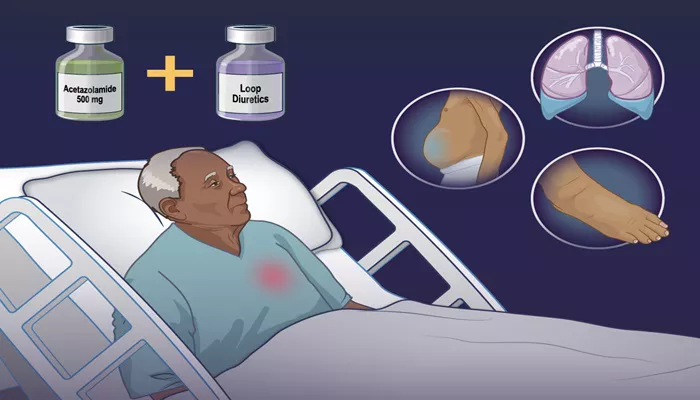Heart failure (HF) is a complex clinical syndrome characterized by the heart’s inability to pump sufficient blood to meet the body’s needs. It is often accompanied by various arrhythmias, which can significantly worsen the patient’s condition and increase mortality risk. Among the therapeutic options available for managing heart failure, amiodarone has emerged as a first-line treatment for patients with concurrent arrhythmias. This article delves into the reasons why amiodarone is favored in treating heart failure, exploring its mechanisms, efficacy, safety profile, and clinical implications.
What Are Heart Failure And Arrhythmias?
Heart failure can manifest in different forms, including systolic and diastolic dysfunction, and can result from various underlying conditions such as coronary artery disease, hypertension, or cardiomyopathy. Arrhythmias, particularly ventricular tachycardia (VT) and atrial fibrillation (AF), are common in patients with heart failure due to structural and electrical remodeling of the heart.
Ventricular Tachycardia (VT): A rapid heartbeat originating from the ventricles that can lead to severe consequences if not treated promptly.
Atrial Fibrillation (AF): An irregular and often rapid heart rate that can lead to stroke and other complications.
These arrhythmias are associated with increased morbidity and mortality in heart failure patients. Therefore, effective management of these arrhythmias is crucial for improving outcomes.
SEE ALSO: How Does Heart Failure Influence Cardiac Output?
The Role of Amiodarone in Heart Failure
Amiodarone is a class III antiarrhythmic agent known for its efficacy in controlling various types of arrhythmias. It works by prolonging the myocardial action potential and refractory period in both atrial and ventricular tissues. This unique mechanism makes it particularly useful in patients with heart failure who are at risk for arrhythmias.
Specific Reasons Why Amiodarone Is First Choice
Efficacy in Arrhythmia Control: Amiodarone has been shown to effectively suppress both ventricular and atrial arrhythmias. Studies indicate that it can significantly reduce the incidence of sustained VT and AF in patients with heart failure, leading to improved clinical stability and quality of life.
Improvement of Left Ventricular Function: Research has demonstrated that amiodarone can improve left ventricular ejection fraction (LVEF) in patients with heart failure. For instance, one study reported a 42% increase in LVEF after two years of treatment with amiodarone.
Improved ventricular function can translate into better exercise capacity and overall well-being.
Safety Profile: Compared to other antiarrhythmic agents, amiodarone is less likely to exacerbate heart failure symptoms or worsen existing arrhythmias. It has a relatively favorable safety profile when used at low to moderate doses, making it suitable for long-term management in this patient population.
Versatility: Amiodarone is effective for various types of arrhythmias beyond VT and AF, including atrial flutter and ventricular fibrillation.
This versatility allows clinicians to use it as a comprehensive solution for patients with multiple arrhythmic issues.
Reduced Risk of Sudden Cardiac Death: Although not all studies have conclusively shown a mortality benefit from amiodarone in heart failure patients, there is evidence suggesting a trend toward reduced sudden cardiac death rates among specific subgroups, particularly those with nonischemic cardiomyopathy. This potential benefit highlights the importance of amiodarone in preventing life-threatening arrhythmias.
Long-Term Management: Amiodarone’s long half-life allows for once-daily dosing after an initial loading phase. This convenience improves patient adherence to treatment regimens, which is critical for managing chronic conditions like heart failure.
Clinical Evidence Supporting Amiodarone Use
Several large-scale clinical trials have investigated the role of amiodarone in patients with heart failure:
The Cardiac Arrhythmia Suppression Trials: These trials demonstrated that while amiodarone effectively suppressed arrhythmias, it did not significantly reduce overall mortality rates compared to placebo.
However, it did show benefits in terms of improved quality of life and functional capacity.a
The GESICA Study: This trial focused on low-dose amiodarone therapy in patients with severe heart failure. Results indicated that amiodarone was safe and effective in controlling arrhythmias without adversely affecting survival rates.
The Valsartan Heart Failure Trial: Although primarily focused on angiotensin receptor blockers, this study included data on patients receiving amiodarone. It highlighted that those treated with amiodarone had better outcomes regarding arrhythmia control.
Considerations And Monitoring
While amiodarone offers significant benefits for managing arrhythmias in heart failure patients, it is essential to monitor for potential side effects:
Thyroid Dysfunction: Amiodarone can cause both hypo- and hyperthyroidism due to its iodine content. Regular monitoring of thyroid function tests is recommended during treatment.
Pulmonary Toxicity: Patients may develop pulmonary toxicity characterized by cough or dyspnea. Early recognition through routine assessments can mitigate severe complications.
Hepatic Function: Liver function tests should be monitored as amiodarone can cause liver enzyme elevations.
Conclusion
Amiodarone remains a cornerstone therapy for managing arrhythmias in patients with heart failure due to its efficacy, safety profile, and ability to improve left ventricular function. Despite some controversies regarding its impact on overall mortality, the drug’s benefits in controlling life-threatening arrhythmias cannot be overstated. For clinicians managing heart failure patients at risk for arrhythmias, amiodarone represents a vital tool that enhances patient outcomes and quality of life.
In summary, the choice of amiodarone as a first-line treatment option stems from its proven effectiveness against various arrhythmias commonly associated with heart failure, its ability to improve cardiac function, its favorable safety profile compared to other antiarrhythmic agents, and its convenience for long-term management.
Related topics:


